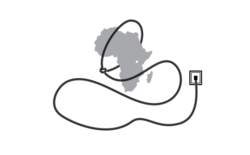A Trap for Africa
In Africa, information and communication technology (ICT) is playing a key role in redesigning the structure of the economy. ICT is enabling new lifestyles and business methods by harnessing the ubiquity of mobile phones in the region. From banking to farming and from education to entertainment, its effects are visible as it drives more efficient business processes across industrial sectors. The African Union agenda to transform the continent into a knowledge economy comprising networks of information societies – made up of electronically linked citizens, companies, and states – will certainly be driven by the capabilities that ICT provides.
In both the private and public sectors, the penetration of ICT has been positive in Africa. Expectedly, governments have responded by anchoring most of their socio-economic development plans on ICT. Technology policy has since morphed into ICT policy with the creation of ICT cabinet positions in most African countries. The argument is that ICT is the pathway upon which government can deliver better services to the citizens. Accordingly, budgets at federal and local levels have been expanded for ICT.
Africa needs ICT-driven productivity in its economy as it integrates people, processes, and tools more efficiently. Yet the continent must look further than ICT if it wants an economy that will be competitive and to be a destination where top global technology companies will open offices to create innovations, not merely to expand sales networks. The continent must find ways to overcome its history of adopting technologies with no plans for adaptation or transfer. From the diamond mines in South Africa to the crude oil rigs in Nigeria, GDP across Africa is dependent on foreign companies – the continent lacks the local competence to harness its own resources despite decades of participation. A continent that offers more mobile apps for agricultural competitions than for new farming techniques must examine its priorities.
Africa must find ways to overcome its history of adopting technologies with no plans for adaptation or transfer. From the diamond mines in South Africa to the crude oil rigs in Nigeria, GDP across Africa is dependent on foreign companies – the continent lacks the local competence to harness its own resources despite decades of participation. A continent that offers more mobile apps for agricultural competitions than for new farming techniques must examine
its priorities
 Africa needs to look at countries that have developed strong, creative ICT capabilities. In these countries, they build up both the downstream and the upstream levels of technology. They create a massive knowledge base in the upstream level, which serves as a platform, and then use the downstream elements to distribute them. When nations focus solely on the downstream, they will never have the ability to transition to the upstream where core innovations are actually being created. When our graduates toil to make mobile apps and learn how to configure routers, the creators of the platforms like iOS (Apple), Android (Google), and microchips (Qualcomm) control the ecosystems. That is why you must renew, re-purchase, and re-license seasonably at the downstream level. Africa cannot bridge the ICT gap with the Western world through ICT importation – ICT is a by-product of many other technologies like semiconductors, microelectronics, and metallurgy.
Africa needs to look at countries that have developed strong, creative ICT capabilities. In these countries, they build up both the downstream and the upstream levels of technology. They create a massive knowledge base in the upstream level, which serves as a platform, and then use the downstream elements to distribute them. When nations focus solely on the downstream, they will never have the ability to transition to the upstream where core innovations are actually being created. When our graduates toil to make mobile apps and learn how to configure routers, the creators of the platforms like iOS (Apple), Android (Google), and microchips (Qualcomm) control the ecosystems. That is why you must renew, re-purchase, and re-license seasonably at the downstream level. Africa cannot bridge the ICT gap with the Western world through ICT importation – ICT is a by-product of many other technologies like semiconductors, microelectronics, and metallurgy.
In nearly all advanced countries, there is a carefully executed master plan with government intervention programs that stimulate the areas where private sectors seldom lead. The US funded MOSIS through DARPA, which enabled private companies, universities, and research labs to drive innovations in integrated circuit designs by removing the burdens to own and operate expensive foundries. The Europractice program, funded by the European Commission, is the European equivalent. Many other governments – including Canada, Brazil, Russia, and China – have similar programs.
Africa needs to understand that invitation letters to Intel and Qualcomm will not replace their salesmen with their designers. Only policies focusing on education, training, and infrastructural development will make that transformation possible. The continent needs to tap into more than just its ICT abilities. In Nigeria, my non-profit – with the support of the Tony Elumelu Foundation – is mapping the innovation ecosystem. It is very possible that Nigeria has the latent potential to become a leader in this area if it can compete on the creative side. It is knowledge like this that can lead to economic improvement if governments pay attention to non-ICT ventures.
Ndubuisi Ekekwe is Founder of the non-profit African Institution of Technology.












